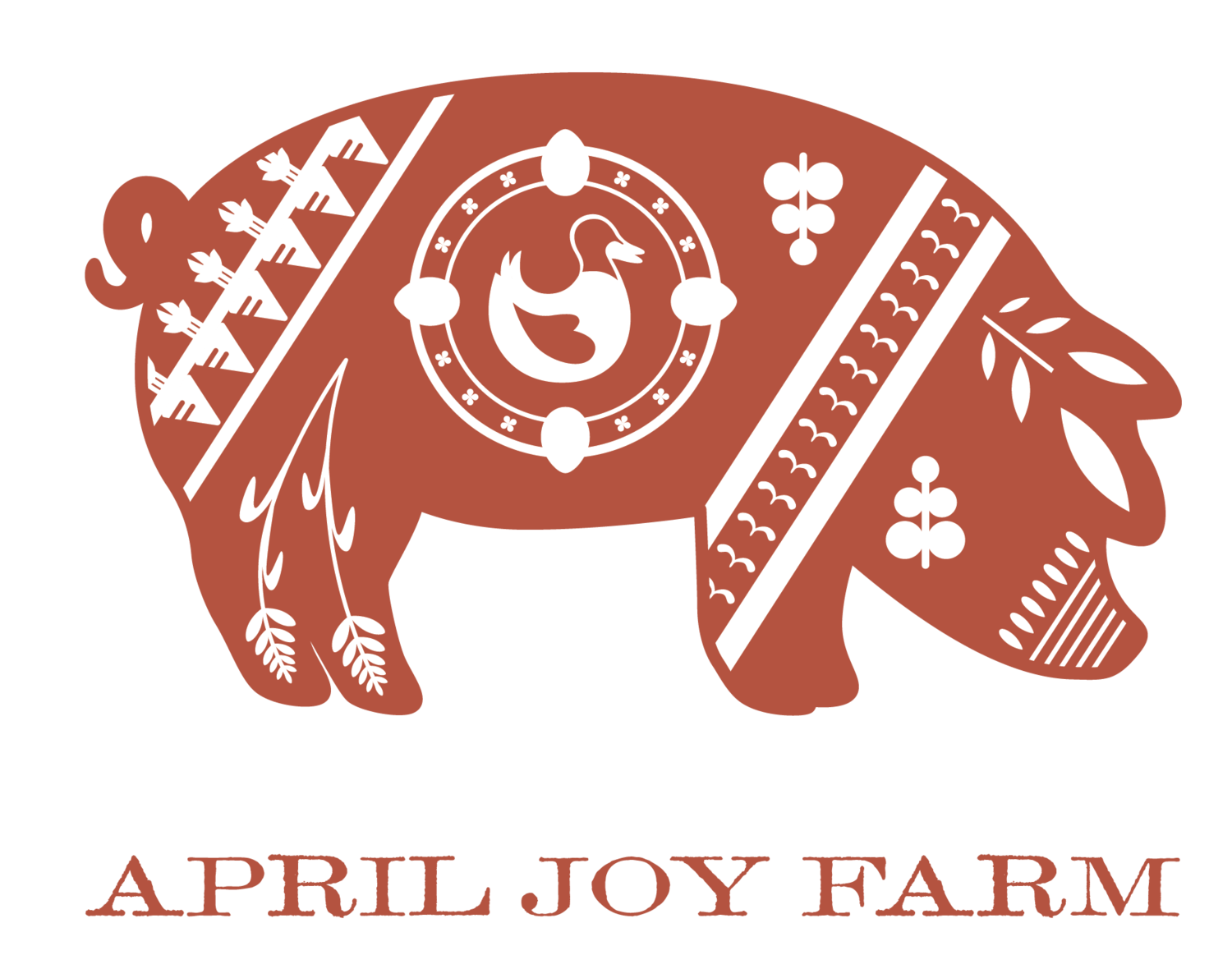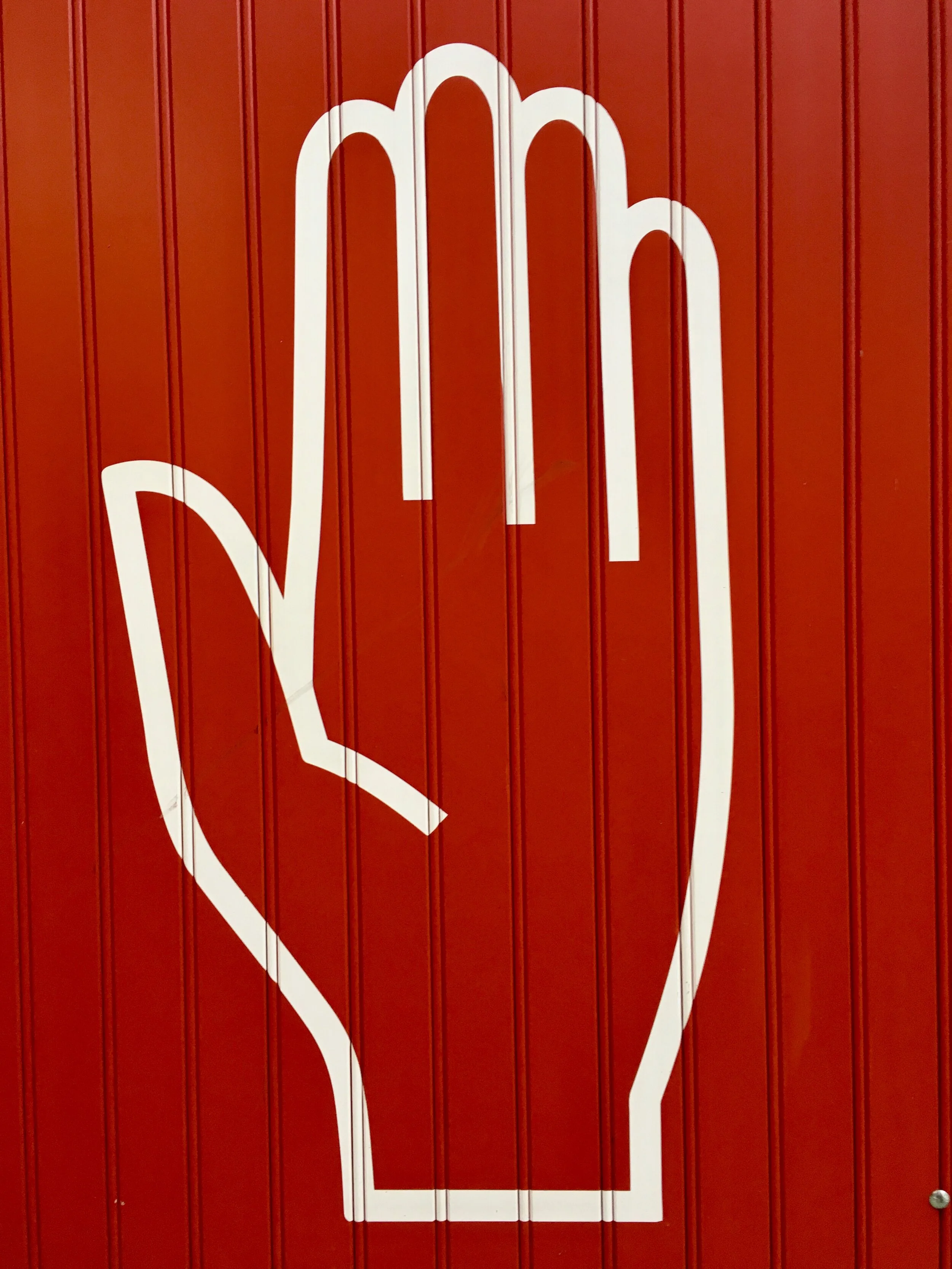The word we’ve banned on April Joy Farm
Legislators, chefs, local food advocates, conservationists, alternative energy sponsors, graduate students and even stumping politicians: the past two years, Brad and I have hosted an unusually diverse number of tour groups at the farm.
Interestingly, no matter what the focus of the tour, every time folks assemble out here at the farm, three conversations inevitably occur. It’s laughable, how this trifecta ‘cooks like a recipe.’ Each distinct conversation is rooted firmly in a specific location along the tour route. If I were one of our little farm goldfinches, I’d grab myself a sunflower seed snack, fly along overhead, and at three key points, I’d chirp to myself, ”Wait for it...”
A word we’ve banned from the farm.
As the group gathers near our seeding house and introductions are made, Brad and I are peppered with side questions. Full of enthusiasm and curiosity about our farm and lifestyle, we answer inquiries about the scope and scale of our operation. We are asked: how many acres? and do we have employees? and what do we grow? and where do we sell it?Then it happens. A well-intentioned soul subjects us to a sentence that always starts with: “You should ________________.” Wherever your imagination can roam, fill in the blank. Don’t think your suggestion too wild, because let me assure you, we’ve heard all sorts of crazy schemes like: add a truffle orchard, sell quail eggs, start a restaurant, even raise buffalo (!!).I know the speaker’s intent is never malicious. On a day I’ve had a nap, I entertain these suggestions with detached amusement. But if I’ve already put in a full day's work before lunch, by the time this question rolls around, I cringe. Sarcasm roars inside. What exactly is it about my countenance that says, “Yes, she definitely needs more irons in the fire!”? The word “should” is insidiously common in our collective vocabulary. Most places people use the s word and don’t think twice about its implications. But at the farm, we consider it worse than most swear words.
Why does a “You should…” strike such a chord with me?
As a fledgling farmer, who had to build her infrastructure and systems from scratch, (no multi-generational farm legacy here), my first few years were fraught with so many plants and animals and projects crying out for attention. No matter where I looked, nearly every day of the year I felt overwhelmingly the inadequacy of my efforts. Like Sisyphus, I’d make a dent in one overgrown patch, only to find three more beds succumbing to weeds. My Dad and I would spend a summer building one section of fence knowing three more sections really needed done. There were barns to clean out, irrigation systems to design and install, green house benches to weld up and animals to keep comfortable with only makeshift houses and not enough hay. It took tremendous effort to stay afloat my first five years. After those years of really pushing hard on so many fronts, I came to recognize a lingering irritability about my countenance. Sure I had moments of true delight, but it felt as if underneath, lurking heavily on my shoulders, there was a mess of grumpy I couldn’t shake.After every season, in the cold, dense light of November, I held an executive board meeting with all the big mucky-mucks of the farm. This included Gus and Tesla (the dogs), Mabel (the cat), and myself, all situated around a nice hot fireplace. (The fire is critical, because there’s something very powerful that happens when you stare into a fire.) It was in that fifth winter, mired in spreadsheets and an estimated expense budget that I broke up with the word “should.”The purpose of my meeting was to contemplate what my efforts over the past year had reaped, and then decide on a high level what I wanted to figuratively ‘sow’ in the coming season. I remember as I recounted the successes and failures of that season, I was making a list of “things to never do again” and a list of what wasn’t working. They were really long lists. Every single thing started with “I should…” I noticed that when I found myself saying I should, what I really was saying was, “I feel bad/guilty because I am not doing X, Y, Z. Which absolutely implied I wasn’t working hard enough or I didn’t care enough. Yeah right! I may not be the most exceptionally talented farmer in the world, but if there are two things I know of myself, it’s that I work really hard and I care deeply.Tesla started snoring, and Mabel yawned. Gus was lying upside down with his back legs stretched way out, warming his belly by the fire. I wasn’t getting a lot of input from this brain trust. Frankly, it was shaping up to be the most depressing executive meeting in my whole farming career. Then I heard a voice say, “Quit beating yourself up.”
Quit beating yourself up. Grasping this conceptually was one thing, but actually changing my patterns of behavior was quite another.
I had to catch myself and rethink what I really meant instead of falling back into a game of blame and guilt. Anytime we tell others they “should” do something, the implication is that what they are doing right now, (and by extrapolation who they are right now) is not enough. Now that’s an idea that needs thrown in the compost pile. Right now! Bury it deep! It is so much better to be honest about what we mean, to be forthright with others as kindly as we can, than hide behind a hurtful should.The banishment of the phrase I should was an absolute game-changer for me. I really believe it is a big reason why I am still in love with farming. Ironic but true: it wasn’t the weather or markets or work that most needed fixing. I didn’t walk out the kitchen door and arrive at a miraculously completed farmstead.
It wasn’t the work that changed, it was my relationship to the work, to the challenges and the ‘incompleteness of farming’ that changed.
You know what I say now? The farm is a work in progress AND I wouldn’t want it any other way. I realized that if everything was all done and the kinks were all worked out, then what’s the point? This big shift set me on the path to a life as a contented and stable farmer. Let's get back to these innocent tour guests. It’s very easy to armchair farm. You just put seeds in the ground and then come back and harvest stuff, right? During our farm tours, I lightheartedly respond to our mis-guided brainstormers, “Well yes, we COULD build a nursery for black fly larvae, but we’d have to give up selling vegetables so we would have appropriate time to devote to those little hatchlings.” Then I point blank tell them carelessly flinging the word should around is a major farm infraction. Such recklessness will quickly earn you a pitchfork and a pig stall to muck out.Then I am just as quick to reinforce that it’s not the ideas themselves I bristle at. Quite the opposite. Individuals with no pre-disposed notions about our farm can come up with some wonderfully creative, fresh-eyed notions.I encourage brainstorming. I encourage the catching of mild cases of farming fever. Blessed with a beautiful location and bountiful resources, who can’t fall under the spell of possibility? With an open, rested mind, there is nothing more fun than taking a Sunday stroll through a farmer’s lane of dreams. This is a place where every corner and nook, every square inch of land, has been protected in its wildness or tended, loved, and put to good use growing or raising something exquisite. Farms like ours are excellent nurseries for big dreams.Just remember, when you come up the farm lane, it’s pretty important to leave the word “should” in your car. We love to brainstorm, and we certainly don’t mind coulds, but shoulds are just a little too pushy, a little to know-it-all. It’s best not to spook the farmers from the get-go, because even though we don’t bite, we aren’t the friendliest critters once we’ve been “should-ed." Any visitor I’ve had this conversation with leaves our farm with a newfound respect for language. Ha. They thought this tour-thing was just going to be all about vegetables! Next week, we will head out through the fields and I’ll fill you in on two more conversations as consistent to our tours as chickens outside their fence. Until then, see if you can’t gift yourself the kindness of a should-free life. Whenever that pesky word crops up, ask yourself what’s really underneath the phrasing and remind yourself: everything in its own time, a time for everything. It’s all about crystal clear priorities. Just like your Mother told you, compliments go a lot further than criticism, especially with oneself.
A person who really wants something will find a way. A person who doesn't will find an excuse. ~Unknown

